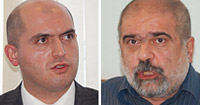The topic of the recent discussion organized by the “Institute of war and peace media coverage” at “Pressing” club was dedicated to the issue of Nagorno Karabakh conflict. During the discussion the head of the “Media Caucasus Institute”, political scientist Alexander Iskandaryan said that all what happened in 2007 in terms of Karabakh conflict was the same as in 2006 or 2005, i.e. nothing happened, and he stressed that hardly there may be any improvements in the settlement process during the coming year.
The discussion was held in participation with experts, analysts, MPs. Most of the ideas spoken by the participants were close to that set forth above. However, it is worth mentioning about the stance of the governing party towards that issue. ARP member, deputy Armen Ashotyan presented the policy of their party in terms of the issue under discussion. However, if the ideas spoken by Mr. Ashotyan seem to be surprising and confusing, note that according to the charter of the party, the official policy of the party may be presented only by the party chair and deputy chairmen. Thus, it is possible that ARP board member Armen Ashotyan expresses only his opinions and such opinions may not correspond to the policies of the governing party. According to Ashotyan, the conflict of Karabakh does not exist. “In 2007 Karabakh is not a conflict any more, Karabakh is a state,” he said. The deputy says that Karabakh is an ethno-territorial unit, which was rapidly merged by the coverage of the Azeri “slow-witted” diplomacy. The problem is that, according to Ashotyan, “the Azeri diplomacy does not understand that a civic status should be given at least to this conflict, which would create grounds to prove the issue of Karabakh, as it is said, being a civic war”. Mr. Ashotyan assures that very often the Armenian, Azeri and Karabakhi top officials may be given assurances and warranties that “Euro integration is the best method of settling such conflicts”. However, according to Ashotyan, “Euro integration does not overcome historical, national, language, religious and other such barriers which have been formed during the history”. He says that even Europe is not sure about it. However, it is not untreatable why the ARP is trying to include the factor of religion in the context of Karabakh conflict in the recent period. Ashotyan re-stated the rumors that have been circulating long before saying that we have solved the problem of Karabakh long before. “Armenia’s problem does not consist in settling the conflict, but giving an international legality to it. Our problem is this one, but not settling the conflict,” he said. Really, there isn’t much to do, the problem has been “solved”, and the only thing remains to do is to make others understand it too and there is no need for “negotiations”. Ashotyan’s next idea comes to prove that the mediators are periodically making statements containing extra optimism concerning the Karabakh conflict so that the Azeri society adapts with the existing situation. “It does not matter how many irrevelent statements are made, at least you are coming to a close end, which brings to a situation, when the Azeri society is adapting to the existing situation more,” he explained. Also, the ARP member MP highlighted that for the first time, the specific weight of budget contribution to military expenses has been cut down in the budget of 2008. “It seems that we are already full,” he explained. Notwithstanding, it turns out that, for example, “International Crisis Group” (ICG) has not seen that. The ICG has published a report, which reads that “Azerbaijan and Armenia should stop the dangerous arming race and press down belligerent rhetoric, turning them into efforts aimed to settling the situation in the Karabakhi region through negotiations”. The experts of ICG say that Azerbaijan and Armenia are increasing their military expenses. It also notes that as a result of lack of political will and “insufficient decisiveness” they have wasted the hope of diplomatic settlement, and the leaders of “the two” countries have set their societies against compromises. “The international community should realize the danger of war with its full seriousness. The danger of armed conflict is growing and the dangers coming out of weakening the efforts are great,” says the director of the ICG Caucasian program, Magdalena Frichova. According to the report, “the Prague process” can serve a ground for peaceful settlement, but the upcoming presidential elections in Armenia and Azerbaijan in 2008 will complicate the political environment, thus the parties have to adopt a document constituting the main principles before the elections even if it includes issues that have not been agreed upon. In fact, the authors of the report don’t know about Ashotyan’s thesis that Karabakh is not a conflict, but a state, and the conflict has been “settled” long before.
P.S. We will publish the entire text of the discussion held at “Pressing” club during one of our future publications.

